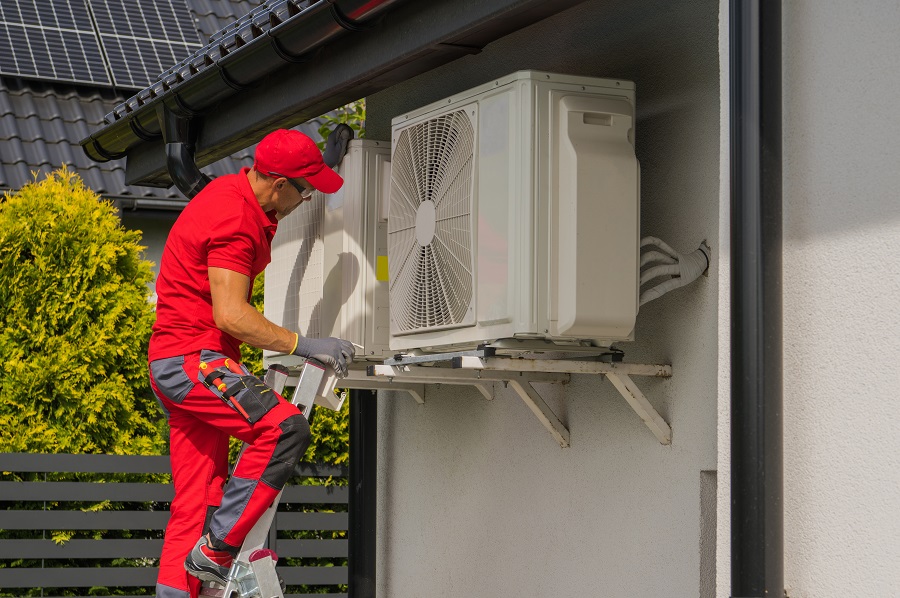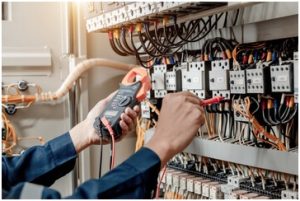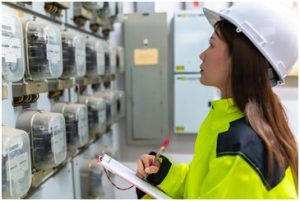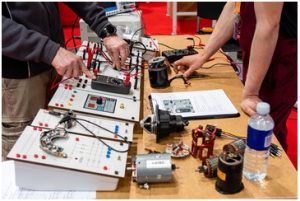
Safety is the first priority in any technical occupation for workers and those around them. HVAC technicians work with electricity and electrical equipment in their daily duties as installers, troubleshooters, and maintenance persons.
Electrical safety must be observed at all times to prevent injuries, deaths, and property damage. HVAC program students learn safety practices and expand upon them in their jobs. Whether working on residential, commercial, or industrial projects, safety is paramount.
The Role Of Electricity In HVAC
 Electricity is the essential component that drives the functioning, efficiency, and productivity of HVAC systems. When we set the thermostat to a different temperature, things begin to happen. We raise or lower the heating and air conditioning levels at home and work for comfort. Electricity powers parts and equipment in a system, including:
Electricity is the essential component that drives the functioning, efficiency, and productivity of HVAC systems. When we set the thermostat to a different temperature, things begin to happen. We raise or lower the heating and air conditioning levels at home and work for comfort. Electricity powers parts and equipment in a system, including:
- Blowers
- Compressors
- Fans
- Heat generation
- Motors
- Thermostats
Electricity is the thread that runs through every part of a typical heating and cooling system. New HVAC and electrical technologies create more energy-efficient equipment, reduce power consumption, and reduce operating costs.
More residential and commercial HVAC systems are becoming automated. Electricity is the enabler of automation processes that allow seamless integration with the system and its control devices.
Why HVAC Electrical Safety Must Be Observed
The first obvious consideration in practicing electrical safety is to eliminate injuries, and in some remote cases, death. Other reasons to maintain safe practices include preventing fires, flying sparks, and electrical shock. Electric shock can:
- Result in burns
- Cause muscle contractions
- Result in cardiac arrest
- Worst of all – death
 The Electrical Safety Foundation International (ESFI) reports that electrical accidents account for about 1,000 deaths and 30,000 injuries each year in the U.S. Faulty HVAC work can lead to electrical fires, power surges, and other incidents that can cause extensive damage. The HVAC system, home, and repair equipment can be damaged and costly to replace.
The Electrical Safety Foundation International (ESFI) reports that electrical accidents account for about 1,000 deaths and 30,000 injuries each year in the U.S. Faulty HVAC work can lead to electrical fires, power surges, and other incidents that can cause extensive damage. The HVAC system, home, and repair equipment can be damaged and costly to replace.
Another reason to observe electrical safety is to avoid legal consequences. Faulty work that causes accidents or property damage can lead to lawsuits that can be very costly. Technicians must observe the best safety practices to prevent problems and preserve their reputations.
Expected HVAC Electrical Safety Practices
HVAC company employees should follow the best safety practices. Employers and government agencies expect workers to observe all regulations related to their work including:
- Wear the correct protective equipment
- Turn off the system before working on it
- Use insulated tools and avoid stepping in water
- Ensure electrical components are properly grounded
- Inspect electrical components before and during work
- Use the correct wire size to prevent problems
- Follow all safety protocols
When someone else is in the house or building you are working on, place a sign that tells them to leave the power off. Before working on any parts or equipment, test the circuit with the correct meter. This will tell you if the circuit is still energized or not. Technicians should use only factory-approved replacement parts when servicing or repairing HVAC equipment.
| “Safety is the first priority in any technical occupation for workers and those around them.” |
HVAC Electrical Safety Taught In Technical Schools
Workplace safety is stressed in HVAC training to protect technicians, home and business owners, and property. HVAC skills and knowledge, especially electrical work, are taught in accredited technical schools at both the high school and college levels.
 The safety practices taught during training should equal those expected by employers and the HVAC industry in general. These are the essential practices students learn:
The safety practices taught during training should equal those expected by employers and the HVAC industry in general. These are the essential practices students learn:
- Alert the home or business owner to leave all controls and the system off
- Make sure the system and circuits are no longer energized
- Wear all personal protection equipment and use insulated tools
- Troubleshoot the system with all required tools and equipment to isolate issues
- Communicate what you are doing with other technicians and home or building owners
- Use factory-approved HVAC devices and equipment
Once employed, graduates will learn about new technologies, equipment, and HVAC systems and their electrical safety precautions.
Gain The Skills And Knowledge You Need
Gain the skills and knowledge you need to work in the HVAC industry at ITI Technical College in Baton Rouge. Earn an Associate of Occupational Studies (AOS) Degree in our Air Conditioning, Refrigeration, and Electrical Technology Program. Request more information for enrolling in our highly-rated program and learn how to find an entry-level job.
For more information about graduation rates, the median debt of students who completed the program, and other important information, please visit our website at: https://iticollege.edu/disclosures/

